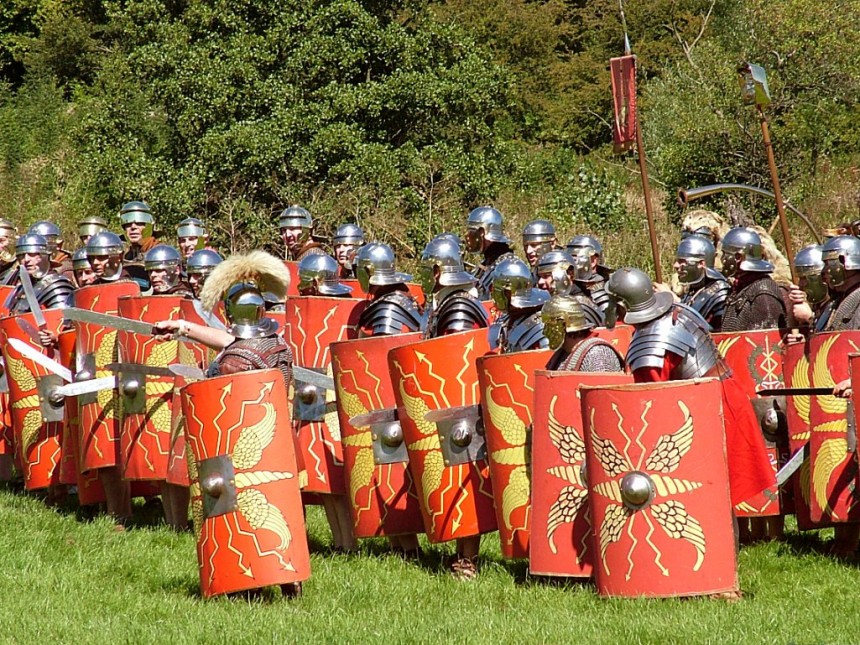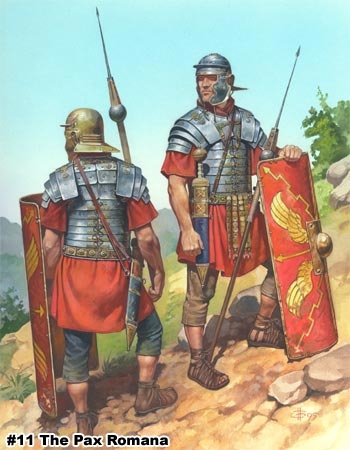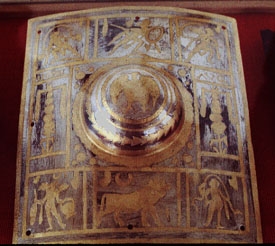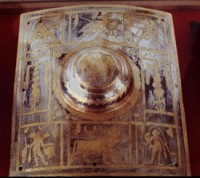
In the book of Numbers, there is the famous story of the twelve spies who went in to spy on Canaan, and after spending 40 days looking around, they came back and said that while the land was good and rich, there were giants in the land, and the Israelites would get killed and enslaved by them if they went in to attack. At least—that’s what ten of them said.
Two of them, Joshua and Caleb, knowing and remembering that God had provided for them and protected them time and time again, trusted that God would do the same thing for them here. They said in Numbers 14, “If the Lord delights in us, then He will bring us into this land and give it to us, a land which flows with milk and honey. Only do not rebel against the Lord, nor fear the people of the land, for they are our bread; the protection has departed from them, and the Lord is with us. Do not fear them.”
Joshua and Caleb knew that the Lord would go before them as their shield and as their strength. They knew that all they had to do was follow God, and He would protect them and provide for them. And they were right. If they had followed God into the promised land, they would not have had to spend 40 years wandering in the wilderness. It was only an eleven day journey from Sinai to Canaan, but because of their lack of faith, that eleven day journey turned into forty years of agony and death in the wilderness.
That is what always happens when we do not trust in God. Joshua and Caleb trusted in God that He would be their shield if they followed Him, but the rest of the nation did not have faith, and so they perished in the wilderness.
But Joshua and Caleb were the only ones of that whole generation to survive and to receive their inheritance in the Promised Land. After the forty years of wandering were complete, we read about how Joshua was chosen to be he leader of Israel as they entered into the land, and that Caleb, though he was now 80 years old (Josh. 14:7), knew that if God was on his side, he could not be beat.
And so when the tribes entered into the land, Caleb went to battle some of the fiercest and strongest opponents there were (Josh 14:12). In fact, it was the very same “giants in the land” that had so scared the ten spies 40 years earlier that Caleb went to battle with. And even though he was now 80 years old, because God was on his side, Caleb was victorious. Caleb walked by faith, in the strength of his God.
And as we turn to Ephesians 6 today to study the fourth piece of spiritual armor, we will see that it is similar to what Joshua and Caleb had. This fourth piece is what gave them confidence in God and gave them certainty of victory—even in the face of overwhelming odds.
Today, in Ephesians 6:16, we are going to look at the Shield of Faith.
Ephesians 6:16. Above all, taking the shield of faith with which you will be able to quench all the fiery darts of the wicked one.
Again, like with the other pieces, let’s look at the picture Paul was using here and how the shield was used in his day by the Roman soldiers, then we will look at how Paul meant for us as Christians in spiritual warfare to use the shield. Finally, we will look at how we can take up the shield of faith.
The Shield for the Soldier
 There were two kinds of shields used by soldiers in Paul’s day, and two different Greek words to describe each. One was smaller and round and could be used by moving the arm to defend a certain part of the body which was being threatened. This is generally the type of shield we think about when we imagine a shield.
There were two kinds of shields used by soldiers in Paul’s day, and two different Greek words to describe each. One was smaller and round and could be used by moving the arm to defend a certain part of the body which was being threatened. This is generally the type of shield we think about when we imagine a shield.
 But there was also another kind of shield. It was much larger than the other, and it was used differently. Rather than moved around to fend off attacks, it was planted in front of the soldier, and sometimes fixed in the ground. In this way, it all but covered the whole body. Sometimes, because of the nature of this shield, it was referred to as a “door.” To get the soldier, you first had to get past the door, or get past the shield. Soldiers crouched behind it as if they were behind a wall.
But there was also another kind of shield. It was much larger than the other, and it was used differently. Rather than moved around to fend off attacks, it was planted in front of the soldier, and sometimes fixed in the ground. In this way, it all but covered the whole body. Sometimes, because of the nature of this shield, it was referred to as a “door.” To get the soldier, you first had to get past the door, or get past the shield. Soldiers crouched behind it as if they were behind a wall.
And we also see from Paul’s choice of words in introducing this piece of the armor that this is the type of shield he has in mind. He says there at the beginning of verse 16, above all, or as it says in some of your translations, in addition. Both ways of translating this are right, but at the same time, both leave out the idea of what I think Paul was really trying to get across. When we read the words, above all, we think that Paul is saying this is the most important piece. But this can’t be what he is saying, because we’ve already seen in weeks prior that it is not the most important piece.
So, recognizing this, some Bible translations use the words “in addition.” This is fine, but it loses the emphasis of above all. So it seems that what Paul means here is along the lines of “in front of all” or “before all.” That is because the shield is the first line of defense. Again, remember, it was sometimes referred to as a door—and so the enemy had to get past the shield, past the door, before he could get to the soldier behind it.
So the shield was the first line of defense. To get to any other piece of the armor, or to get to the soldier, the enemy had to get past the shield first. The shield not only protected the body of the soldier, but the other pieces of armor as well. It protected everything. But in combat, there was one thing that the shield of this sort was really good for. The shields were excellent for protecting the soldiers from the arrows and spears from the enemy. A big bulky shield like that is not really good for hand to hand combat, is it? It’s hard to maneuver with such a shield, so they would form up, plant the shields in the ground, and hide behind them.
Shields were large, the first line of defense, and especially effective against spears and arrows. Which is—as some of you have already recognized—exactly what Paul talks about next in verse 16. In the second part of verse 16, Paul tells us that this shield will protect us from fiery darts.
These fiery darts were the most advanced weapons of Paul’s day. Archeologists tell us that in Paul’s day, some of the arrows and spears had tips made of some sort of combustible material which was then lit on fire and shot or thrown into the enemy forces.[1] They also made some with hollow tips which were then packed with this combustible material and when it struck a soldier or a shield, it would splatter and burn. This was before the days of gunpowder, so these weapons were pretty ingenious.
So Paul mentioned the most dreaded and cunning weapons of his day—the flaming darts—they came in quickly so they were hard to see, and when they hit, they would burn or explode. The shield Paul has in mind here was used by soldiers as their first line of defense to protect themselves, and deflect the enemy arrows and spears—some of which were tipped with fire and combustible material. That is the shield for the soldier.
The Shield for the Christian
It is fairly clear from verse 16 what Paul intends the shield to be used for by Christians in spiritual warfare. Paul says, taking the shield of faith with which you will be able to quench all the fiery darts of the wicked one. To understand what the shield is, it helps to understand the other elements in this verse.
The wicked one is an obvious reference to Satan, and the weapons he is described as using here are typical of the type of weapons he prefers. Satan loves covert operations. Though he is the prince of darkness, he masquerades as an angel of light. Though his followers are wolves, they appear in sheep’s clothing. So these fiery darts are the perfect weapon for Satan. He can shoot them from far off. They come in quick and without warning. They cause great pain and great damage if they hit flesh. They can be sent one at a time, or in a heavy hail of arrows.
So with all of these thing in mind, I think that Paul’s reference here to the fiery darts of the wicked one is a reference to the cunning and crafty ways the devil tries to tempt us. Temptations often come when and where we least expect them. They come in quick and without warning. If we fall to a temptation, the sin that results is often very painful and destructive. And the temptations can come one at a time, or in a deadly hail all at once.
And so the only way we can defend ourselves is by having ready the shield of faith at all times. If we are always protected by the shield of faith, none of Satan’s fiery darts can get through whether he sends them at night or at day, whether one at a time or hundreds at a time. Whenever and wherever temptation comes, the shield of faith can deflect them.
And notice from verse 16 that more than just deflect these darts, the shield can quench them. The shield of faith causes the flaming darts to lose their fire and their force.
And it isn’t just able to do this to some of the fiery darts, but verse 16 says the shield is able to quench all of the fiery darts, all the wiles of the devil. Those wiles of the devil are the same thing as the fiery darts of the wicked one here. And the shield of faith can protect us from each and every one of those.
But, just as with all the other pieces of armor, this protection is not automatic. Just as we have to put on the belt of truth, the breastplate of righteousness and the sandals of the gospel, so also we have to take up the shield of faith.So let’s turn third and finally to look at how we can do that. How we can, as Christians, take up the shield of faith.
Taking up the Shield
First of all, in taking up the shield, we need to be reminded again that like all the other aspects of the armor, this piece also is from God’s armory. And the idea that faith is a shield is everywhere in Scripture, but with a small twist. For example, in Genesis 15, where Abram believes God and his faith was credited to him as righteousness, we are told in verse 1 that God will be Abram’s shield. God will protect Abram as Abram places faith in God.
We find this same idea throughout the entire Old Testament. This idea is found at least 20 times in just the book of Psalms alone. Over and over again, God, in whom we place our trust, is described as our shield and fortress. The One who protects us from the enemy.
In Psalm 91:4, God’s faithfulness itself is described as a shield, and in Psalm 76:3 we read that God breaks the arrows of our enemies. Even over in Proverbs 30:5, we read that God is a shield to those who put their trust in him.
So we have seen a little twist or surprise in Ephesians 4:16 when we go back to look at where Paul got this idea from. He tells us to take up the shield of faith, but we learn by going back to the Old Testament that the shield is actually God Himself, and He protects us, when, as Christians, we place faith in Him.
Now think about this with me for a moment. I told you that the shield Paul has in mind here was like a wall, or a door behind which the soldier hid. The shield was considered to be the first line of defense. For an enemy to get to the soldier, the enemy had to get past the shield first. So with God as our shield, ask yourself, “What have we to fear?” Can anything get past God? No, of course not!
Therefore, as Christians, we have nothing to fear from Satan, or wicked men, or future events. God is on our side. To get through to the other pieces of armor, the enemy has to get past God first. And there is not any chance of that. Like the shepherd protecting the sheep in the pen by laying himself down as the door so wolves have to go though the shepherd to get to the sheep, so also any sin that gets to us has to go through God, because He is our shield. He is our door.
But if that is the case, why do we still sin? All of us still do sin. So somehow, the weapons of the enemy, the fiery darts of the wicked one, the temptations of Satan, do get through to us. So the question is how? If God is our shield, how do they get past Him?
Well the answer is found right here in verse 16. Paul says taking the shield of faith. The only way a fiery dart gets past the shield, the only way a temptation gets past the protective shield of God, the only way we get wounded spiritually is because we have not taken up the shield of faith. We have let down our guard. We have dropped the shield.
You see, as long as the shield is up, nothing can get through. But when we drop it, although we still have our other pieces of armor, we leave ourselves exposed to the darts. So that is why Paul encourages us to take up the shield of faith. He says in verse 16, taking the shield of faith. As long as we are placing faith in God, our shield is up. But when we being to trust in ourselves, or in our own strength, we drop our shield, and temptation drops us where we stand.
The Bible refers to keeping faith in God as living by faith. You see, the Christian life is by faith from first to last. We become Christians, as I shared last week, by placing faith in Jesus Christ alone for eternal life.
But for some reason, many of us, having become Christians by faith alone in Christ alone, then try to live as Christians by works. We say, “Well, now that I am a Christian, I have to attend church, and give money, and be honest at work, and be a good person.”
But none of us, on our own, can do these things, and so we fail time and time again, and the Christian life becomes a life of defeat. We fall time and time again to temptation after temptation. We commit sin after sin. Sometimes there is a certain sin in our lives which we just cannot seem to beat. The reason for this, I would suggest, is because we have been trying to put up the shield of works rather than the shield of faith. You see, works are important in the Christian life, but they are the result of living by faith, not the means of living by faith.
Paul says in Colossians 2:6, “Just as you received Christ Jesus…” how is that? By faith. “…so also continue to live in Him.” In other words, we become Christians by faith alone, and we live as Christians by faith alone.
When we believe in Jesus, we are justified, and receive eternal life. And after receiving eternal life, as we continue to believe in Jesus, we are sanctified, and receive the abundant life. Jesus says in John 10:10 that he came not only to give us eternal life, but also the abundant life. And both come by faith alone in Christ alone. Let me see if I can explain all of this more clearly. The Bible describes living the Christian life with the terms, “living by faith” or “walking in the Spirit” or “walking in the light” (Col 2:6; Hab 2:4; Rom 1:17; Gal 3:11; Eph 5:8; Heb 10:38; 1 John 1:7).
The reason so many of us fall so frequently to sin and temptation is because we are trying to walk in the flesh. We are trying to beat sin under our own power. We are trying to live the Christian life by works. But victory over sin and Satan and the world and the flesh comes only through walking by faith. So, in an effort to help you learn how to walk by faith, how to take up the shield of faith, how to allow God to be your bodyguard, I want to conclude this morning with a short discussion on how to live by faith.
How to Live by Faith
How do we as Christians live by faith? How do we as Christians take up the shield of faith? One definition of living by faith which I have been able to come up with is this:
Living by faith is taking God at His Word and acting upon it—even when it makes no sense to the rest of the world.
This definition of living by faith involves two aspects. First, living by faith is taking God at His Word. That means believing that what God has said is true. Obviously, before you can believe what God has said, you have to know what God has said. And the main way you can know what God has said is by looking into His Word, the Bible. It is amazing for me to hear people who claim to be living by faith, but they never read their Bible. Sometimes, these people even say that because they are living by faith, they don’t have to read their Bible.
But Romans 10:17 says that faith comes by hearing, and hearing by the Word of God. You cannot live by faith unless you know what it is that God has said in His Word. Paul says the same thing several times over in Galatians 3. He refers to hearing with faith. The point is that as we hear or read the Word of God, we either believe it or we don’t. And if we do believe it, then, as the definition of living by faith says, this belief, this ongoing faith, will result in actions, will result in Christ-honoring works.
I know this is a difficult concept, so probably the best way I can explain this is by illustrating it. Hebrews 11 is the faith chapter of the Bible, and it records the accounts of great men and women of the past who lived by faith. Hebrews is an amazing book full of truths and lessons about Jesus Christ and how we as followers of Jesus can live by faith.
And chapter 11 is the faith chapter of the Bible. It is not a chapter telling unbelievers how they can be saved by faith alone in Christ alone. It is a chapter telling believers how they can live by faith and so receive reward in heaven (11:6).
In verse 8, we read about how God told Abraham to go on a journey, and Abraham took God at His Word and acted upon it. In verses 24-26, we are reminded about how Moses took God at His word and acted upon it. We read in verses 30 and following that this is the same thing that Joshua and Rahab and the Judges did. In living by faith, they took God at his word and acted upon it—even when what they were doing made no sense to the rest of the world. And then in chapter 12, the writer of Hebrews goes on to encourage us to live by faith since we have seen so many go before us who have lived by faith and have done amazing for God.
The end of the matter this morning is this. As we read the Word of God, and believe what it says, and act upon it, we are living by faith. Though we do not see how our actions might affect the future, though we may not receive our inheritance right now, though we might go through persecution and trials and nakedness and danger and sword, if we just put our faith in God, as we keep our eyes on Jesus, “Keep the Son in our eyes,” as we, like Peter, keep our eyes on Jesus rather than on the rolling waves around us, we will walk by faith.
And as we walk by faith, we are keeping our shield up, and God, who is our shield, will protect us and fend off the enemy, and will quench all of the fiery darts of the wicked one. If you want to be victorious in your Christian life, then like Caleb, who was 80 years old, and yet still went out to fight the fiercest opponents possible—we can take up the shield of faith, we can place our trust in God, and go forward in victory.
———-
[1] Maclaren, Expositions of Holy Scripture – Ephesians; Epistles of St. Peter and St. John, 361-363.




What is the fiery darts of the enemy?
Good question. I believe they are temptations, doubts, fears… all the things the devil throws our way to get us to move away from God and His great love for us.
Is curiosity the greatest fiery darts of the enemy?
This has been a blessing to me especially the ilustrations
Glad it helped!
Prayed you a blessing. Expanded my belief in the necessity to study the bible so I know what I know what I know. Thank you for posting this explanation.